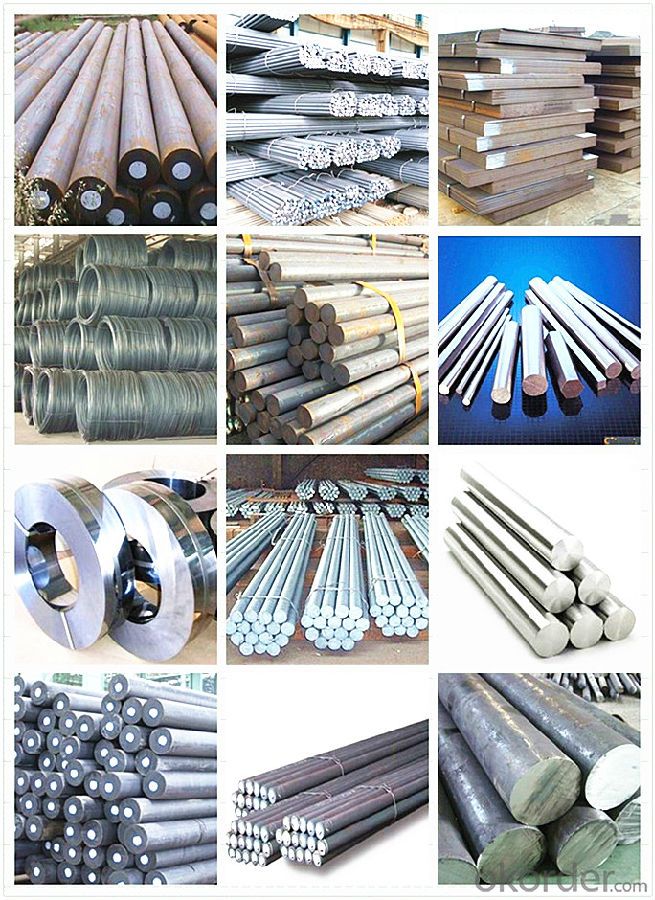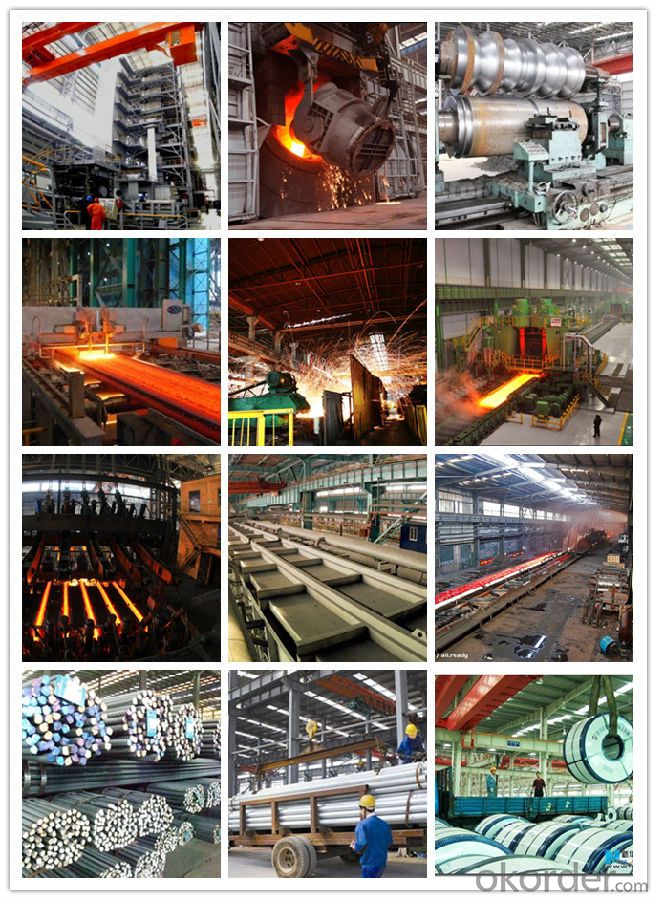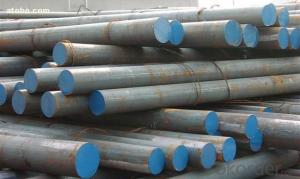Special Steel JIS SCr440 Alloy Steel Round Bars
- Loading Port:
- China main port
- Payment Terms:
- TT OR LC
- Min Order Qty:
- 20 m.t.
- Supply Capability:
- 10000 m.t./month
OKorder Service Pledge
OKorder Financial Service
You Might Also Like
Item specifice
Product information:
Standard | JIS G4053-2003 | ||||||||||
Grade | JIS SCr440 | ||||||||||
MOQ | 1 Metric Ton | ||||||||||
Diameter | 8mm~1500mm | ||||||||||
Length | 6m,12m or as required. | ||||||||||
Diameter Tolerance | As required | ||||||||||
Condition of delivery | Hot rolled,Cold Rolled or as required. | ||||||||||
Chemical Composition(%) | |||||||||||
C | Si | Mn | P | S | Cr | ||||||
0.37-0.44 | 0.17-0.37 | 0.50-0.80
| ≤0.035 | ≤0.035 | 0.80-1.10 | ||||||
Ni | Cu | ||||||||||
≤0.30 | ≤0.030 | ||||||||||
Mechanical Properties(In Quenching and Tempering) | |||||||||||
Tensile strength | Yield strength | Elongation | Reduction in Area | Impact | Hardness | ||||||
(σb/MPa) | (σs/MPa) | (δ5/%) | (ψ/%) | (J) | (HB) | ||||||
≥980 | ≥785 | ≥9 | ≥45 | ≥47
| ≤207 | ||||||
Product Show:

Workshop Show:

Shipping
1. FedEx/DHL/UPS/TNT for samples, Door-to-Door;
2. By Air or by Sea for batch goods, for FCL; Airport/ Port receiving;
3. Customers specifying freight forwarders or negotiable shipping methods!
Delivery Time: 3-7 days for samples; 5-25 days for batch goods.
Payment Terms
1.Payment: T/T, L/C, Western Union, MoneyGram,PayPal; 30% deposits; 70% balance before delivery.
2.MOQ: 1pcs
3.Warranty : 3 years
4.Package Informations: 1) EXPORT, In 20 feet (GW 25 ton) or 40 feet Container (GW 25 ton)
2)as customer's requirement
Why choose us?
(1) The leading exporter in China special steel industry.
(2) Large stocks for various sizes, fast delivery date.
(3) Good business relationship with China famous factories.
(4) More than 7 years steel exporting experience.
(5) Good after-sales service guarantee.
- Q:How is special steel used in the production of aircraft landing gear?
- Due to its outstanding mechanical properties and durability, special steel is extensively utilized in the manufacturing of aircraft landing gear. The landing gear, a critical component responsible for supporting the weight of an aircraft during takeoff, landing, and ground operations, must endure tremendous forces, impact loads, and harsh environmental conditions. Special steel, including high-strength low-alloy (HSLA) steel or alloy steel, is carefully chosen for its remarkable strength-to-weight ratio, high resistance to fatigue, and excellent ability to resist corrosion. These characteristics are essential in ensuring that the landing gear can withstand the extreme forces and stresses encountered during aircraft operations. The utilization of special steel in the production of landing gear offers multiple advantages. Firstly, it enables the landing gear to be lighter in weight, contributing to an overall reduction in the aircraft's weight. This results in improved fuel efficiency and increased capacity for carrying cargo, which are crucial factors in enhancing the performance of modern aircraft and reducing operating costs. Secondly, the high fatigue resistance of special steel ensures that the landing gear can endure repeated loading cycles without experiencing significant degradation in performance. This is of utmost importance since the landing gear is subjected to substantial stress during each landing and takeoff. It must be capable of withstanding these forces over a long operational lifespan. Furthermore, the excellent corrosion resistance properties of special steel guarantee that the landing gear remains protected from environmental elements such as moisture, salt, and other corrosive substances. Corrosion can weaken the structure of the landing gear, compromising its integrity and safety. Therefore, the use of special steel helps to ensure the longevity and reliability of the landing gear, reducing the need for maintenance and associated costs. To summarize, special steel plays a vital role in the manufacturing of aircraft landing gear due to its exceptional strength, fatigue resistance, and corrosion resistance. Its incorporation allows for the production of lighter and more durable landing gear, resulting in improved aircraft performance, enhanced efficiency, and increased safety.
- Q:How does special steel perform in terms of hardness?
- Special steel performs exceptionally well in terms of hardness. Due to its unique alloy composition and precise manufacturing process, it exhibits superior hardness compared to conventional steel. This enhanced hardness allows special steel to withstand high pressures, resist wear and tear, and provide excellent performance in demanding applications across various industries.
- Q:What are the different methods of surface anodizing for special steel?
- There are several methods of surface anodizing for special steel, including electrochemical anodizing, plasma electrolytic oxidation (PEO), and chromic acid anodizing. Each method has its own advantages and suitability for different steel types and desired outcomes. Electrochemical anodizing involves immersing the steel in an electrolyte solution and applying an electric current to form an oxide layer on the surface. PEO utilizes a high-voltage electrical discharge to create a thicker and more durable anodized layer. Chromic acid anodizing, on the other hand, utilizes a mixture of chromic acid and sulfuric acid to achieve corrosion protection and improved surface properties. The choice of method depends on the specific requirements and characteristics of the special steel being anodized.
- Q:Can special steel be used for making springs?
- Indeed, springs can be crafted using special steel. Recognized as alloy steel, special steel possesses augmented mechanical attributes like impressive tensile strength, toughness, and resistance against corrosion. Consequently, it serves as an optimal substance for the production of robust and dependable springs across diverse applications. The precise variant of special steel employed in spring production hinges upon the particular necessities of the application, be it a desired degree of flexibility or resistance against fatigue. All in all, special steel bestows extraordinary performance and endurance in the realm of spring manufacturing.
- Q:What are the different types of special steel coatings?
- There are several types of special steel coatings, including zinc coatings (galvanization), aluminum coatings (aluminizing), chrome coatings (chromium plating), and ceramic coatings, among others. Each type of coating offers unique benefits and properties, such as corrosion resistance, improved durability, increased hardness, and enhanced heat resistance, depending on the specific application requirements.
- Q:What are the applications of special steel in aerospace engineering?
- Special steel is widely used in aerospace engineering for various applications. It is used to manufacture critical components such as turbine blades, landing gear, and structural parts that require high strength, toughness, and resistance to extreme temperatures. Special steel alloys, such as stainless steel and nickel-based alloys, are used due to their excellent corrosion resistance, heat resistance, and ability to withstand harsh environments. These materials ensure the safety and reliability of aircraft, enabling them to operate under demanding conditions and meet stringent performance requirements.
- Q:How does special steel contribute to the manufacturing of automotive engine components?
- The manufacturing of automotive engine components heavily relies on special steel to enhance their strength, durability, and performance. Special steel possesses unique properties that make it suitable for critical engine parts like crankshafts, camshafts, connecting rods, valve springs, and cylinder heads. The exceptional strength of special steel is one of its primary advantages in automotive engine components. Engine parts made from special steel can withstand high stress, heavy loads, and extreme temperatures without experiencing deformation or failure. This strength ensures that the engine operates efficiently and reliably, even under demanding conditions. Furthermore, special steel offers superior durability, which is crucial for the longevity and performance of engine components. Its resistance to wear, corrosion, and fatigue ensures that the engine parts maintain their functionality for an extended period. This durability translates into increased lifespan and reduced maintenance requirements for the engine, resulting in higher customer satisfaction and lower costs for vehicle owners. The use of special steel in automotive engine components also contributes to improved performance. Special steel allows for the creation of lightweight components, reducing the overall weight of the engine and enhancing fuel efficiency. Additionally, the high precision and dimensional accuracy achievable with special steel manufacturing processes result in better engine performance, reduced friction, and improved power output. Moreover, special steel exhibits excellent machinability, simplifying the manufacturing process of engine components. Its ability to be easily formed, cut, and shaped enables the production of complex designs and intricate features, leading to enhanced efficiency and performance in the final product. In conclusion, special steel plays a vital role in the manufacturing of automotive engine components due to its exceptional strength, durability, and performance. Its usage results in engines that are more reliable, efficient, and long-lasting, ultimately contributing to the overall quality and satisfaction of vehicles.
- Q:What is the impact of impurities on the machinability of special steel?
- The impact of impurities on the machinability of special steel can be significant. Impurities in the steel, such as sulfur, phosphorus, and non-metallic inclusions, can adversely affect the performance and machinability of the material. Sulfur is commonly present in steel as an impurity, and it tends to form brittle compounds that can reduce the machinability of the steel. High levels of sulfur can lead to increased tool wear, poor surface finish, and decreased cutting tool life. Therefore, it is essential to control the sulfur content in special steel to ensure good machinability. Phosphorus is another impurity that can have a negative impact on machinability. It tends to form hard and brittle compounds, which can cause tool chipping, breakage, and poor chip control. High levels of phosphorus can also lead to reduced cutting tool life and surface finish. Non-metallic inclusions, such as oxides, sulfides, and silicates, are also significant impurities in steel. These inclusions can act as stress concentrators, leading to increased tool wear and decreased machining quality. Large inclusions can cause tool breakage and interrupt the machining process. Therefore, minimizing the presence of non-metallic inclusions is crucial for improving the machinability of special steel. Overall, impurities in special steel can have a detrimental effect on its machinability. To ensure good machinability, it is important to control and minimize the levels of impurities like sulfur, phosphorus, and non-metallic inclusions. This can be achieved through careful selection of raw materials, refining processes, and quality control measures during the manufacturing of special steel.
- Q:What are the main applications of special steel in the electronics packaging?
- Special steel is widely used in electronics packaging due to its unique properties. The main applications of special steel in electronics packaging include providing high strength and durability to protect delicate electronic components, offering excellent corrosion resistance to safeguard against environmental factors, and ensuring thermal conductivity for efficient heat dissipation. Additionally, special steel is utilized in creating precise and intricate shapes for components, ensuring electromagnetic compatibility, and providing electrical conductivity for improved performance and reliability in electronic devices.
- Q:What are the different surface coatings available for special steel?
- There are several different surface coatings available for special steel, such as galvanizing, electroplating, powder coating, and organic coatings. Each coating offers unique benefits and characteristics, ranging from enhanced corrosion resistance to improved aesthetic appearance and durability. The choice of coating depends on the specific requirements of the application and the desired outcome for the steel product.
1. Manufacturer Overview |
|
|---|---|
| Location | |
| Year Established | |
| Annual Output Value | |
| Main Markets | |
| Company Certifications | |
2. Manufacturer Certificates |
|
|---|---|
| a) Certification Name | |
| Range | |
| Reference | |
| Validity Period | |
3. Manufacturer Capability |
|
|---|---|
| a)Trade Capacity | |
| Nearest Port | |
| Export Percentage | |
| No.of Employees in Trade Department | |
| Language Spoken: | |
| b)Factory Information | |
| Factory Size: | |
| No. of Production Lines | |
| Contract Manufacturing | |
| Product Price Range | |
Send your message to us
Special Steel JIS SCr440 Alloy Steel Round Bars
- Loading Port:
- China main port
- Payment Terms:
- TT OR LC
- Min Order Qty:
- 20 m.t.
- Supply Capability:
- 10000 m.t./month
OKorder Service Pledge
OKorder Financial Service
Similar products
New products
Hot products
Related keywords





























